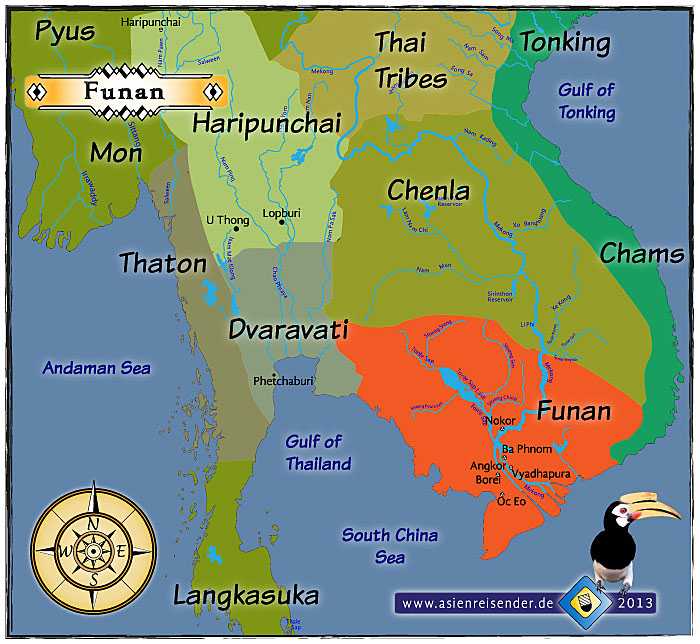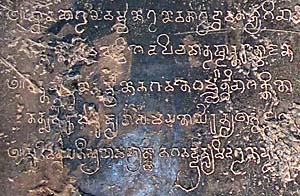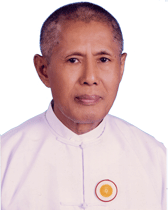A chronology of key events:
7th-10th cent AD - Hindu and Buddhist Dvaravati culture, thought to be of the ethnic Mon people, predominates.
 Ruins of Sukhothai, capital of the first major Thai kingdom
Ruins of Sukhothai, capital of the first major Thai kingdom
10th-14th cent - Southern Thailand is ruled by
the mainly Mon Lavo Kingdom, but with growing influence from the Khmer
neighbouring Empire. (modern-day Cambodia). The Tai people - the
antecedents of modern ethnic Thais - start to move southwards into the
area.
1238-1448 - Thai-speaking Sukhothai kingdom
expands its rule further south, coming to dominate much of modern-day
Thailand, before being eclipsed by a rival Thai kingdom in the south,
Ayutthaya.
1350-1767 - Ayutthaya kingdom gradually
brings Thailand under its control and becomes a major power in Southeast
Asia. At its greatest extent around 1600, it rules parts of modern-day
Cambodia, Laos and Burma.
1448 - King Ramesuan joins Ayutthaya and Sukhothai in personal union.
1590-1605 - Reign of Naresuan. Seen as
Ayutthaya's greatest king, he ends a period of Burmese overlordship and
briefly conquers Cambodia and parts of southern Burma.
1767 - Invading Burmese forces sack the capital, Ayutthaya, bringing an end to the kingdom.
 Thai Royal navy oarsmen in ancient warrior costume
Thai Royal navy oarsmen in ancient warrior costume
1768-1782 Under Taksin the Great, an ethnic
Thai Chinese, the briefly-lived Thonburi Kingdom re-establishes Thai
control. Taksin is toppled by a coup launched by General Chao Phraya
Chakri, who founds a new dynasty centred on Bangkok.
Rise of modernThailand
1782 - Beginning of the Chakri dynasty under
King Rama I, which rules to this day. The country is known as Siam. New
capital of Bangkok founded.
1804-1868 - Reign of King Mongkut (Rama IV), who embraces Western innovations and initiates Thailand's modernisation.
1868-1910 - Reign of King Chulalongkorn.
Employment of Western advisers to modernise Siam's administration and
commerce. Railway network developed.
1917 - Siam becomes ally of Great Britain in World War I.
1932 - Bloodless coup against absolute monarch King Prajadhipok. Constitutional monarchy introduced with parliamentary government.
1939 - Siam changes its name to Thailand ("Land of the Free").
1941 - Japanese forces land. After
negotiations Thailand allows Japanese to advance towards
British-controlled Malay Peninsula, Singapore and Burma.
1942 - Thailand declares war on Britain and US, but Thai ambassador in Washington refuses to deliver declaration to US government.
Post-war uncertainty
1945 - End of World War II. Thailand
compelled to return territory it had seized from Laos, Cambodia and
Malaya. Exiled King Ananda returns.
Continue reading the main story
Capital: Bangkok
Bangkok, known as "Krung Thep" - City of Angels
- Population: 7.2 million
- Original settlement established by Chinese traders
- Became capital of Kingdom of Siam in 1782
1946 - King Ananda assassinated.
1947 - Military coup by the wartime, pro-Japanese leader Phibun Songkhram. The military retain power until 1973.
1965 onwards - Thailand permits US to use bases there during the Vietnam War. Thai troops fight in South Vietnam.
Short-lived civilian rule
1973 - Student riots in Bangkok bring about
the fall of the military government. Free elections are held but the
resulting governments lack stability.
1976 - Military takes over again.
1978 - New constitution promulgated.
1980 - General Prem Tinsulanonda assumes power.
1983 - Prem gives up his military position and heads a civilian government. He is re-elected in 1986.
1988 - General Chatichai Choonhaven replaces Prem after elections.
1991 - Military coup, the 17th since 1932. A civilian, Anand Panyarachun, is installed as prime minister.
Continue reading the main story
Temples
Wat Phrathat Doi Suthep temple is located near northern city of Chiang Mai
1992 - New
elections in March replace Anand with General Suchinda Kraprayoon. There
are demonstrations against him, forcing him to resign. Anand is
re-instated temporarily. Elections in September see Chuan Leekpai,
leader of the Democratic Party, chosen as prime minister.
1995 - Government collapses. Banharn Silpa-archa, of the Thai Nation party, elected prime minister.
1996 - Banharn's government resigns, accused of corruption. Chavalit Yongchaiyudh of the New Aspiration party wins elections.
Financial turmoil
1997 - Asian financial crisis: The baht falls
sharply against the dollar, leading to bankruptcies and unemployment.
The IMF steps in. Chuan Leekpai becomes prime minister.
1998 - Tens of thousands of migrant workers
are sent back to their countries of origin. Chuan involves the
opposition in his government in order to push through economic reforms.
1999 - Economy begins to pick up again. Thai
media highlight high cost of drug treatments for Aids and HIV. Thailand
begins to put pressure on drugs companies to find ways to make the
drugs cheaper.
Continue reading the main story
Drugs
Thousands were killed in controversial anti-drug drive
2001 January - New Thai Love Thai party wins elections after partial re-run of poll. Leader Thaksin Shinawatra forms coalition government.
2001 June
- Burma-Thailand
border crossing, which was closed after clashes between the two
countries' troops in February, re-opens after Thaksin visits Burma.
2002 May
- Burma closes
border with Thailand again after Thai army fires shells into Burma
during battle between Burmese army and ethnic Shan rebels. Border
reopens in October.
Temple row
2003 January - More than 500 Thai nationals
are evacuated from Cambodia amid angry protests after remarks attributed
to by a Thai actress that Cambodia "stole" its Angokr Wat temple
complex from Thailand.
2003 February - Controversial crackdown on
drugs starts; more than 2,000 suspects are killed. The government blames
many of the killings on criminal gangs; rights groups say
extra-judicial killings were encouraged by the authorities.
2004 January-March - Martial law is imposed
in largely-Muslim south after more than 100 killed in a wave of attacks
blamed on Islamic militants.
2004 February - More than 100 Islamic militants die in coordinated attacks on police bases in the south.
2004 October - 85 Muslim protesters die,
many from suffocation, while in army custody following violence at a
rally in the south. An enquiry concludes they were not killed
deliberately.
Tsunami
2004 December
- Thousands of
people - both Thais and foreign tourists - are killed as when a massive
tsunami, triggered by an undersea earthquake off the coast of Sumatra,
devastates communities on the south-west coast, including the resort of
Phuket.
Continue reading the main story
Hero for a time
Policeman-turned-tycoon Thaksin Shinawatra transformed Thai politics but was ousted in a military coup
2005 March - Thaksin Shinawatra begins a second term as PM after his party wins February's elections by a landslide.
2005 July - As violent unrest continues in
the south, Prime Minister Thaksin is given new powers to counter
suspected Muslim militants in the region. In November the death toll in
violence since January 2004 tops 1,000.
2005 October - Thailand redoubles efforts to fight bird flu as fresh outbreaks of the disease are reported.
Coup
2006 April-May - Snap election called by the
PM amid mass rallies against him is boycotted by the opposition and is
subsequently annulled, leaving a political vacuum. The PM takes a
seven-week break from politics.
2006 August - Prime Minister Thaksin
Shinawatra accuses several army officers of plotting to kill him after
police find a car containing bomb-making materials near his house.
2006 19 September- Military leaders stage a
bloodless coup while Prime Minister Thaksin Shinawatra is at the UN
General Assembly. Retired General Surayud Chulanont is appointed as
interim prime minister in October.
2007 January - Martial law is lifted in more than half of the country.
2007 April - First draft of a new constitution is approved by a committee appointed by the military administration.
2007 May - Ousted PM Thaksin Shinawatra's Thai Rak Thai party is banned. Thousands of soldiers are put on alert.
2007 August - Voters approve a new, military-drafted constitution in a referendum.
Democracy restored
2007 December- General elections mark the
first major step towards a return to civilian rule. The People Power
Party (PPP), seen as the reincarnation of Thaksin's Thai Rak Thai (Thais
Love Thais) party, wins the most votes.
Continue reading the main story
Temple row
The Preah Vihear temple sparked a border standoff with Cambodia
2008 February -
Return to civilian rule. Samak Sundaravej of the Thaksin-linked People
Power Party (PPP) is sworn in as prime minister. Ousted premier Thaksin
Shinawatra returns from exile.
2008 July - Pojaman Shinawatra, the wife of
former prime minister Thaksin Shinawatra, is found guilty of fraud and
sentenced to three years in jail. She is granted bail pending an appeal.
2008 August - Thaksin flees to Britain with his family after failing to appear in court to face corruption charges.
Unrest
2008 September - Opposition protesters
occupy Bangkok's main government complex and begin mass anti-government
protests calling for the resignation of Prime Minister Samak Sundaravej.
Constitutional Court dimisses PM Sundaravej for violating a
conflict of interest law by hosting two television cooking shows while
in office. Somchai Wongsawat chosen by parliament as the new prime
minister, but the street protests against the PPP government continue.
2008 October - Thai troops shoot dead two
Cambodian soldiers in a firefight on the disputed stretch of the two
countries' border, near the Preah Vihear temple.
Thai Supreme Court gives fugitive former PM Thaksin
Shinawatra a two-year jail sentence after finding him guilty of
corruption over a land deal.
Continue reading the main story
Hmong expulsion
The UN voiced concern over the fate of Hmong repatriated from Thailand
2008 November -
Tens of thousands of opposition People's Alliance for Democracy
supporters rally around parliament in Bangkok and blockade Thailand's
main airports in "final battle" to topple the government.
Anti-Thaksin forces in power
2008 December - Prime Minister Somchai
Wongsawat is forced from office by a Constitutional Court ruling
disbanding the governing People Power Party for electoral fraud and
barring its leaders from politics for five years.
Opposition leader Abhisit Vejjajiva forms a coalition to
become Thailand's new prime minister, the country's third new leader in
three months.
2009 March-April - Supporters of former PM Thaksin Shinawatra hold mass rallies against the government's economic policies.
2009 April - Continuing unrest forces the
cancellation of an ASEAN summit after anti-government protesters storm
the summit venue in the resort of Pattaya.
PM Abhisit Vejjajiva moves troops into Bangkok to end an
opposition protest sit-in. More than 120 people injured in resulting
clashes.
2009 June - Leaders of the protest group
that helped topple Thaksin Shinawatra apply to register themselves as
the New Politics Party.
2009 November - Row with Cambodia grows over
the appointment of Thaksin Shinawatra as an economic adviser to the
Cambodian government. Cambodia takes over Thai-owned air traffic control
firm.
2009 December - Up to 20,000 Thaksin
supporters rally in Bangkok to demand fresh elections. Mr Thaksin
addressed them by video-link.
Thailand deports about 4,000 ethnic Hmong back to
communist-ruled Laos, deeming them to be economic migrants. The UN and
US expressed concern about their possible reception in Laos.
2010 February - Supreme Court strips Mr
Thaksin's family of half of its wealth after ruling that he illegally
acquired $1.4bn during his time as PM. Security forces placed on high
alert amid fear of clashes with Thaksin supporters.
Red Shirts
2010 March-May - Tens of thousands of
Thaksin supporters - in trademark red shirts - paralyse parts of central
Bangkok with months-long protests calling for PM Abhisit's resignation
and early elections. Troops eventually storm the protesters' barricades
in a bid to break the deadlock and end the demonstrations. The death
toll in the violence - the worst in the country's modern history - is
put at 91.
2010 August - Thailand resumes diplomatic
ties with Cambodia after Phnom Penh announces that ousted Thai PM
Thaksin Shinawatra is stepping down as its economic advisor.
Continue reading the main story
Protest politics
Thailand's polarised politics has led to waves of mass protest
2010 November -
Thailand extradites Russian national Viktor Bout to the US on charges of
arms dealing, after months of legal wrangling. Russia says the move is a
"glaring injustice" and politically motivated.
2011 January - Tensions rise as Cambodia charges two Thai citizens with spying after arresting them for crossing the disputed border.
2011 February - After an exchange of fire
across the Thai-Cambodian border, the two countries agree to allow
Indonesian monitors access to the area to prevent further clashes.
2011 April - Eighteen people are left dead
after border dispute over land near the ancient Preah Vihear temple on
the Thai-Cambodian sparks armed clashes.
Election sweep
2011 July - The pro-Thaksin Pheu Thai party
wins a landslide victory in elections. Yingluck Shinawatra - the sister
of Mr Thaksin Shinawatra - becomes prime minister.
2011 October - The government introduces a
rice subsidy scheme with the aim of ensuring that farmers - who form the
main part of Pheu Thai's social base in the rural north of Thailand -
receive a guaranteed price for their rice crop. The scheme causes
government debt to soar, and the resulting increase in the price of Thai
rice causes the country to lose its rank as the world's number one rice
exporter.
2012 June - Anti-government yellow-shirts
blockade parliament to prevent debate on proposed reconciliation bill
aimed at ending six-tear-old political tensions. Group fears that a
proposed amnesty would enable the return of ousted PM Thaksin
Shinawatra.
2012 November - Police disperse 10,000-strong protest in Bangkok calling for overthrow of Prime Minister Yingluck Shinawatra.
New Pitak Siam (Protect Thailand) movement led by retired Gen
Boonlert Kaewprasit unites yellow-shirts and others who see the
government as a puppet of exiled former PM Thaksin Shinawatra.
2012 December - Former Prime Minister
Abhisit Vejjajiva is charged with responsibility for the death of a taxi
driver shot by troops during anti-government protests in Bangkok in
2010.
Peace moves
2013 February - Government, Muslim separatists in south sign first-ever peace talks deal.
2013 April - Constitutional Court blocks moves by ruling Pheu Thai party to amend 2007 post-coup constitution.
2013 June - Government cuts guaranteed price for rice, provoking an angry reaction from farmers and protests in Bangkok.
PM Yingluck Shinawatra reshuffles cabinet for fifth time,
sacking commerce minister responsible for rice price subsidy cut and
taking on defence portfolio herself.
2013 July - Government, Muslim separatists in south agree to Ramadan ceasefire.
2013 November - Tens of thousands of
opposition supporters protest in Bangkok against a proposed political
amnesty bill that critics say would allow ousted leader Thaksin
Shinawatra - the brother of Prime Minister Yingluck Shinawatra - to
return to Thailand without facing jail.
2013 December - In response to opposition
pressure, PM Yingluck Shinawatra announces that early elections will be
held in February 2014 but rejects calls for her to step down in the
meantime.
Former prime minister Abhisit Vejjajiva charged with murder
over 2010 crackdown on demonstrators in which more than 90 people died.
Mr Abhisit, leader of the opposition Democrat Party, denies the charges
and is granted bail.
The opposition says that it will boycott the February elections.
Source:
http://www.bbc.co.uk/news/world-asia-15641745


























